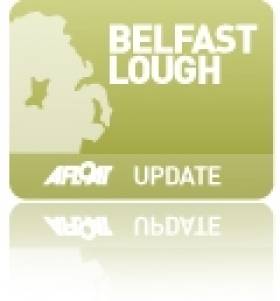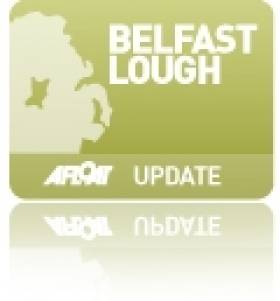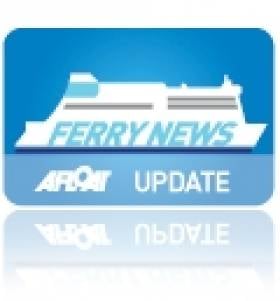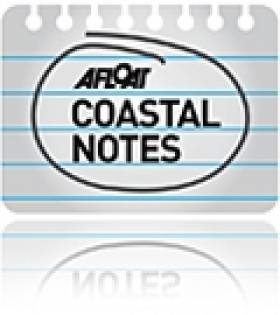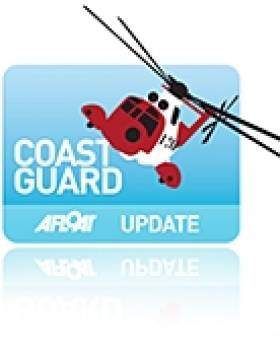Displaying items by tag: psni
Belfast Lough Beach Flasher Faces Fine
#BelfastLough - A 31-year-old man from Newtownabbey has been fined a total of £600 (€697) for assaulting a police officer and exposing himself at a beach on the shores of Belfast Lough.
As UTV News reports, Belfast Magistrates Court heard that Robert John Stewart was "stoned out of his head" during the incident at Hazelbank Park in which he winded one PSNI officer and dropped his shorts to others when he ran away to the nearby beach.
His defence lawyer told the judge that he "unreservedly apologises" for his behaviour in what was "a drunken episode".
UTV News has more on the story HERE.
#BELFAST LOUGH - A woman has been arrested on suspicion of wasting police time after reports of a baby falling overboard from a ferry in Belfast Lough have turned out to be unfounded.
As previously reported on Afloat.ie, a large-scale coastguard search operation was mounted on Wednesday evening after two people were said to have fallen overboard from the Stena Line ferry en route to Belfast from Cairnryan in Scotland.
The woman, who is from Belfast, was recovered from the lough shortly after the alarm was raised and taken to the Royal Victoria Hospital for treatment, according to The Irish Times.
BBC News reports that the search operation was called off "after enquiries with the 37-year-old woman and her family".
A statement from the PSNI said it did "not believe there was a baby in the woman’s care on the ferry". The woman is currently being held at a police station in Belfast.
#FERRY NEWS - The captain of the cargo ship Union Moon, who was arrested after his vessel collided with a passenger ferry in Belfast Lough, has been charged with 'excess alcohol by the master of a ship'.
BBC News reports that the 55-year-old was set to appear in court today, following his arrest yesterday.
No one was injured in the incident on Wednesday, when the Union Moon collided with the Stena Feronia close to the Fairway buoy between Carrickfergus and Helen's Bay. Both vessels were substantially damaged.
The cargo ship, which was carrying 2,000 tonnes of aggregate, was brought back to Belfast. Philip McNamara of the Donaghdee lifeboat confirmed that a large section of her bow was missing.
Meanwhile, engineers from Stena Irish Sea are assessing the damage to their vessel to determine how long it will be out of service. The Stena Feronia sails the route from Belfast to Birkenhead in Merseyside.
The Maritime and Coastguard Agency, the Marine Accident Investigation Branch and the PSNI are all involved in the investigation.
BBC News has more on the story HERE.
- Ferry news
- collision
- Belfast Lough
- cargo ship
- Union Moon
- captain
- charged
- drink
- excess alcohol
- ferry
- Stena Feronia
- Birkenhead
- Merseyside
- court
- Fairway buoy
- Carrickfergus
- Helen's Bay
- Philip McNamara
- Donaghdee
- Lifeboat
- Stena Irish Sea
- Maritime and Coastguard Agency
- Marine Accident Investigation Branch
- psni
Two Bodies Recovered from Water Near Belfast
#NEWS UPDATE - The PSNI has confirmed that the body recovered from Belfast Lough yesterday morning is that of missing Stranraer man Carius McNicoll.
According to BBC News, the 24-year-old student was last seen on a ferry shortly before docking on 8 January.
His body was discovered near Holywood in Co Down. A post-mortem has confirmed that the cause of death was drowning.
In a separate incident yeserday, The Irish Times reports that a body recovered by divers in the River Lagan is believed to be that of a missing 20-year-old man.
John Murphy had reportedly entered the river at the Lagan Weir after an evening at the nearby Odyssey Arena last month. The body found has yet to be formally identified as Murphy.
In the wake of his loss, Murphy's family has called for an end to cheap drinks promotions.
Search for Missing Kayaker to Resume
Emergency services were set to decide this morning whether to resume the search for a kayaker who went missing on Carlingford Lough earlier this week, UTV News reports.
Area man Mark McGowan, 37, was last seen kayaking in the lough at 7.30pm on Monday evening.
His blue kayak was spotted by the Irish Coast Guard on Tuesday at Killowen Point, on the north side of the lough.
Dundalk Gardaí are co-ordinating the cross-border search operation, which was interrupted by bad weather early yesterday.
View Larger Map
Also assisting are the Irish rescue helicopter, Greenore coastguard, Kilkeel's RNLI lifeboat, the south Down coastguard team and the Community Rescue Service.
Meanwhile, the PSNI has appealed for anyone who might have information on McGowan's disappearance to get in touch.
McGowan is described as 5'7" tall, medium build, with a clean shaven, tanned complexion and short bleached blonde hair. He was last seen wearing a red jacket, blue jeans and white trainers.
Police Seek Help from Northern Ireland's Coastal Communities
Project Kraken is a UK-wide campaign which aims to increase vigilance along the coastline and encourage the community to work together to help combat any criminal or terrorist activity.
Inspector David Connery explains: "We're encouraging those living by the coast and members of the maritime community to look out for any suspicious activity and report it to the police immediately so that we can take action if necessary.
"Beaches, marinas and harbours can be uncomplicated points of entry into Northern Ireland and police rely on members of the public to make us aware of anything untoward.
"Please contact police immediately if you find:
Unusual boat movements late at night or early in the morning.
People being landed at unusual locations.
People not knowing about boat handling.
People with inadequate dress for sailing.
Boats moving around at night time with no navigational lighting.
RIBS being loaded / unloaded at unusual times.
RIBS being loaded / unloaded at unusual places.
Packages being transferred out at sea from larger boats.
Packages being transferred to waiting cars.
Strangers acting suspiciously within the marina.
Strangers wanting to hire boats.
Boats with extra fuel tanks.
Boats with above average crew for the size of boat.
"If you notice anything suspicious or unusual please never involve yourself or touch any suspicious packages. Make a note of any registration numbers, markings or descriptions, and call your local police on 0845 600 8000. If the situation requires an emergency response, call 999.
"If someone would prefer to provide information without giving their details, they can contact the independent charity Crimestoppers and speak to them anonymously on 0800 555 111," Inspector Connery added.
Police are also encouraging local boat owners to register their vessels with the PSNI Ports Unit. This means that in the event of a theft, the rightful owners of the boat can be identified more quickly. Forms can be found on www.psni.police.uk or please contact the PSNI Ports Unit on 0845 600 8000.
Police Diver's Court Bid for Overtime Rejected
A Northern Irish police diver's claim that he was owed more than £30,000 in overtime has been rejected by the UK High Court, BBC News reports.
Constable Mark Lloyd, previously of the PSNI's underwater search unit, argued that he was entitled to overtime pay for being available round the clock over a 15-year period.
The court also heard how in 2006 Constable Lloyd and other members of the diving team faced disciplinary action related to their refusal to forgo holiday leave.
His barrister noted that the team were issues with pagers and expected to be on 24-hour call-out at all times barring illness or annual leave with no special allowances.
Lawyers for the PSNI – which outsourced the diving team operation in 2008 - countered that being on call was equivalent to "being expected to receive a pager or mobile phone call".
Though the judge, Justice McCloskey, held there was "no error of law" relating to the payment of overtime and rejected the claim for a judicial review, he added that Constable Lloyd may still have cause to claim for special allowances in specific circumstances.
Police Investigate Carlingford Boating Accident as Boy (6) Remains Critically Ill
It is understood another speedboat hit the youngster, leaving him with serious head injuries.
In a statement released on behalf of the Wilson family, Reverend David Somerville said:
"The family of Stuart Wilson, aged six years old, say that he remains critically ill. They would like to thank people for their support and prayers but appeal for privacy at this difficult time. They ask everyone to continue to pray for Stuart."
Stuart was given first aid on Cranfield Beach by a doctor and an off-duty nurse before being rushed to Daisy Hill hospital in Newry by ambulance.
Heavy Rains Cut off Walkers
The 55 year old male, and 53 year old female from Falkirk were situated about 400 yards from the car park, but due to the very heavy condition of the river were unable to cross back across the bridge.
The South Down Coastguard Rescue Team were immediately turned out and the Coastguard in Dublin were contacted requesting the use of the Irish Coastguard helicopter, R116.
The man was winched with a member of the Coastguard Team, and taken to the helicopter landing site at Donard car park. The female was walked down to the Bloody Bridge car park along with members from the South Down Team.
Ian Murdock, Belfast Coastguard Watch Manager said
"We are urging visitors to have an eye on the weather forecast and the terrain into which they are entering, if they are intending to go out walking. Tourists are very welcome and the area is of outstanding natural beauty and is the most picturesque mountain district in Ireland. The twelve peaks include Slieve Donard, which at 850m is Northern Ireland's highest mountain. Some areas can be quite rugged and we are advising visitors to wear the correct footwear and ensure they have some form of communication device on them in case of unforeseen difficulty."


























